Smallhold, New York City’s only mushroom farm, was founded on the principle that consumers should expect more from their food—it should be local, organic and fresh. Typically, Smallhold is a wholesaler, building and operating miniature mushroom farms and selling quality produce to retailers and restaurants. However, since Covid-19 struck, the company is now offering direct-to-consumer mushroom growing kits.
Americans who fear the fungi have negative feelings because they’ve had a bad experience, were brought up on canned button mushrooms, or saw limp and lifeless examples on grocery store shelves. Smallhold’s co-founders, Andrew Carter and Adam DeMartino, realize this bias is largely thanks to the mushroom industry’s supply chain. Mushrooms aren’t made to travel, and they often spend too long in transit. Even if a local store has shiitake available, the shipping time likely means it’s left in a sorry state by the time it arrives. “Buyers don’t have access to the fresh produce that customers really want to buy,” Carter says. So Smallhold changed the way this particular food is distributed, building mini-mushroom farms and bringing them directly into a store or restaurant. It’s here the retailer’s product grows.
The mini-farms that Smallhold creates are as futuristic in their appearance as they are in their outlook—they’re fully automated and managed offsite by a team at the Smallhold office in Brooklyn. While browsing Brooklyn Whole Foods, you could easily mistake the company’s creation for a work of art. However, the design is fully functional. Even its size has been carefully considered. Currently, Smallhold only operates in the New York City metro area, “and it’s one of the worst places to try and put something somewhere,” DeMartino jokes. The company has had to be inventive, even slotting these units in stylish rows above the city’s favourite restaurant bars.
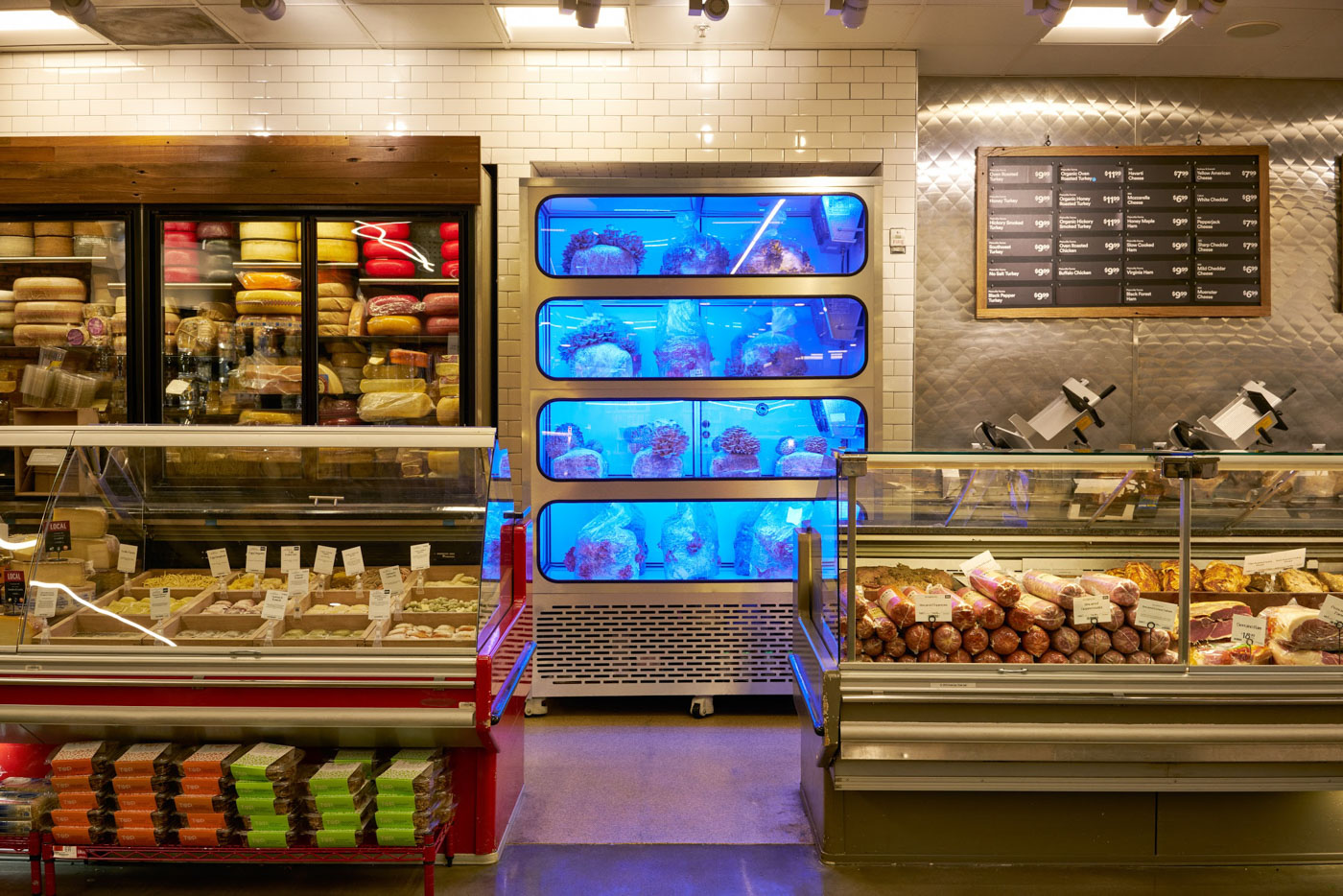
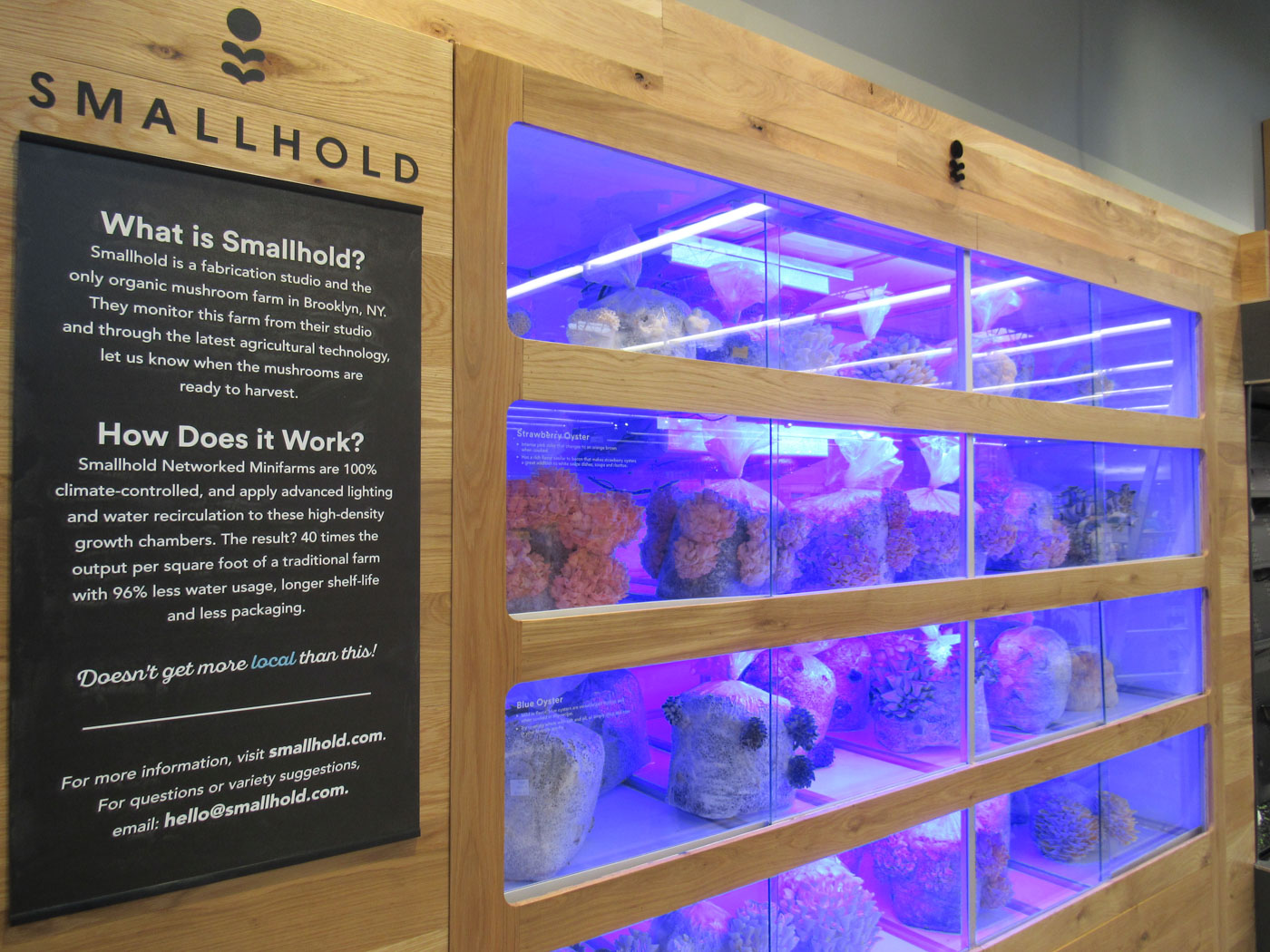
“Each mini-farm collects thousands of data points a day. The data is automatically uploaded to our servers through 4G connection,” Carter explains. “We’re collecting this information so we can constantly learn and set these units with the perfect parameters. We aim to grow the best produce possible.” Since these mini-farms are all controlled remotely, the experience is entirely hands-off for the retailer. The climate in these units is carefully controlled, keeping it cool and humid with constant airflow. Each shelf is a different temperature, dependent on the type of mushroom growing, which ranges from the majestic pink oyster mushroom to the bulbous lion’s mane. Even the club-like lights aren’t for show; the company uses specific spectrum LEDs to stimulate fruit body formation.
Urban farming, by having to contend with limited space, has to be innovative. The mushrooms are grown on carefully sourced sacks of sawdust, a clean waste stream from the North East timber industry. And by having mini-farms directly placed where the demand is, you also remove the environmental cons associated with shipping. Since Smallhold doesn’t sell mushrooms outside of New York City, they use considerably less energy and fossil fuels.
Thirty to forty percent of the food supplied to Americans is wasted; thirty-one percent of this is lost at the retail level. Stores buy in bulk. “When you’re selling food in this way, all you can hope for is that people buy it,” Carter says. “If not, you have to throw it away, donate or compost it.” Since Smallhold’s mini-farms are producing a fresh product that isn’t going rancid on the shelves, it’s more likely to be snapped up.
The importance of a local food supply is becoming increasingly evident during the current battle with Covid-19. We can get food from all corners of the globe—until a catastrophe hits. “People have realized how fragile the food supply chain is,” DeMartino says. As the hospitality industry closes its doors, farms, having lost buyers, are dumping tons of produce. Alternatively, suppliers are having issues getting the items that typically come from oceans away. The potential solution? Retailers can reconnect with local producers.
When the restaurants in New York City shut their doors, Smallhold lost half its revenue stream. Like others in the hospitality industry, they’ve witnessed friends lose their jobs and hopes for the future. However, Smallhold adapted quickly, unintentionally launching a new product—direct-to-consumer mushroom growing kits. “Within a week of the lockdown, we turned the whole situation upside-down,” DeMartino says. The company has generated the income they lost, as well as managed to get sustenance to local New Yorkers.
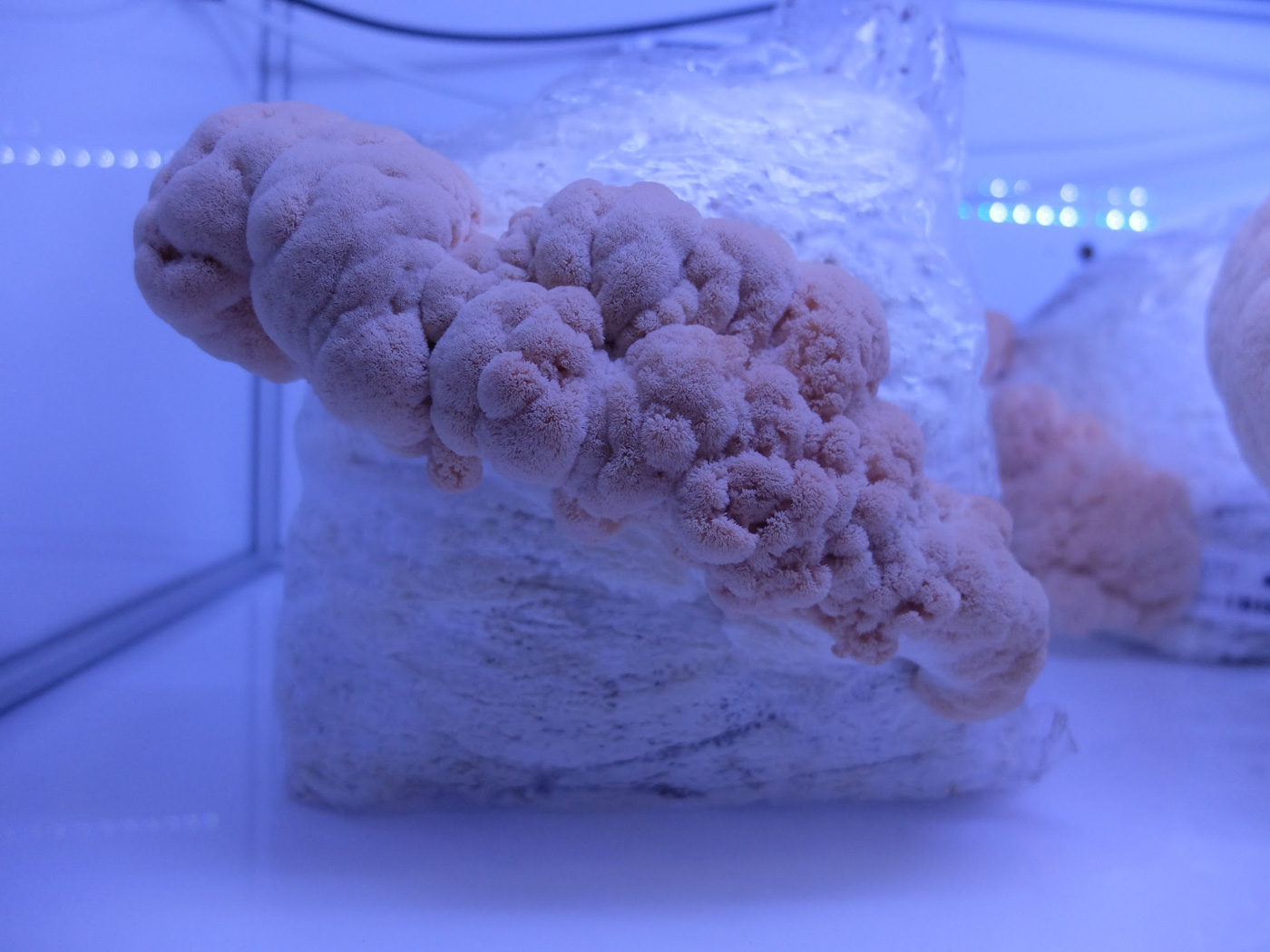
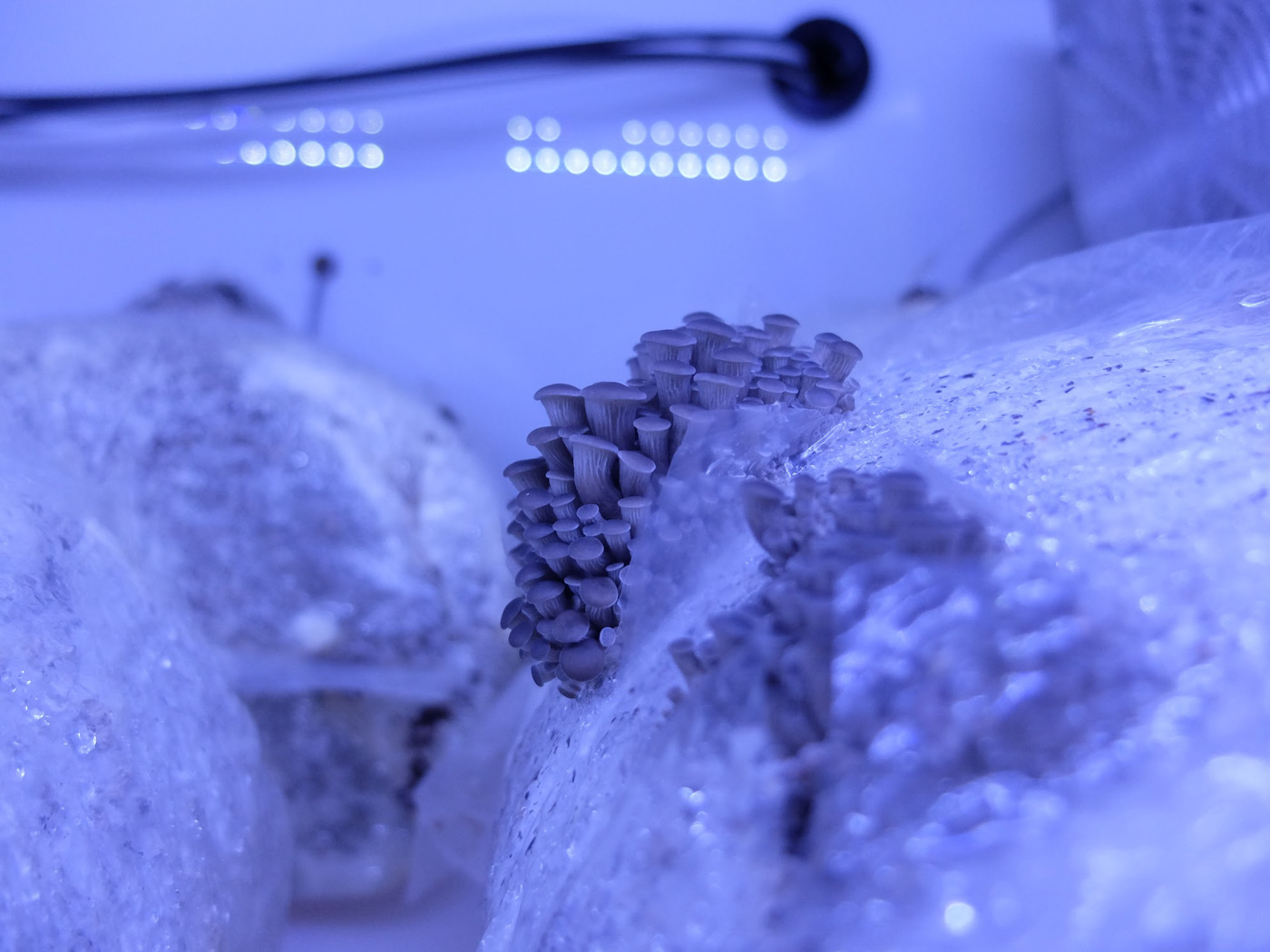
Since individuals are spending more time at home practicing a relationship with self-sufficiency, it’s the perfect moment to start growing your own food, and Smallhold seems to have kicked off a craze. With the kits, you can grow either lion’s mane or blue oysters. Once you’ve received your block, all you need is a spray bottle filled with water, a rubber band, and a clean, sharp knife. “We’ve created this whole new ecosystem,” De Martino says. “Everyone we’ve sold this product to is naming their mushroom blocks and cooking crazy recipes they didn’t have time for before. Having these interactions and creating these bonds with the individuals who are actually buying our mushrooms is one of the most humbling and rewarding experiences of our lives.” That’s the beauty of mushrooms—they’re a kingdom and culture anyone can get lost in.
New York City is no stranger to grafting and growing its own. Sheep grazed in Central Park’s Sheep Meadow from 1860 to 1934, and farm gardens existed in the city’s parks until the 1960s. “People in New York City used to grow their food and sell it to each other,” DeMartino says. “That’s actually the definition of what a Smallhold is. It’s a small patch of farmland where someone can grow something for their neighbor.” The meaning behind the company’s name has never rung as true as it does now for the co-founders.
As New York City becomes the epicenter of the pandemic, its sense of community is growing stronger. People are focusing on food, friends and family—connections they’re at risk of losing. “Every time a catastrophe happens, people turn inwards,” DeMartino says. “What you’ll find in the middle of that introspection is the farmer. They might be underpaid, and you might forget about them up until a catastrophe hits. But when something like this happens, the farmer is always there growing food because they have to, and they’ll still be there when you forget about them again.”





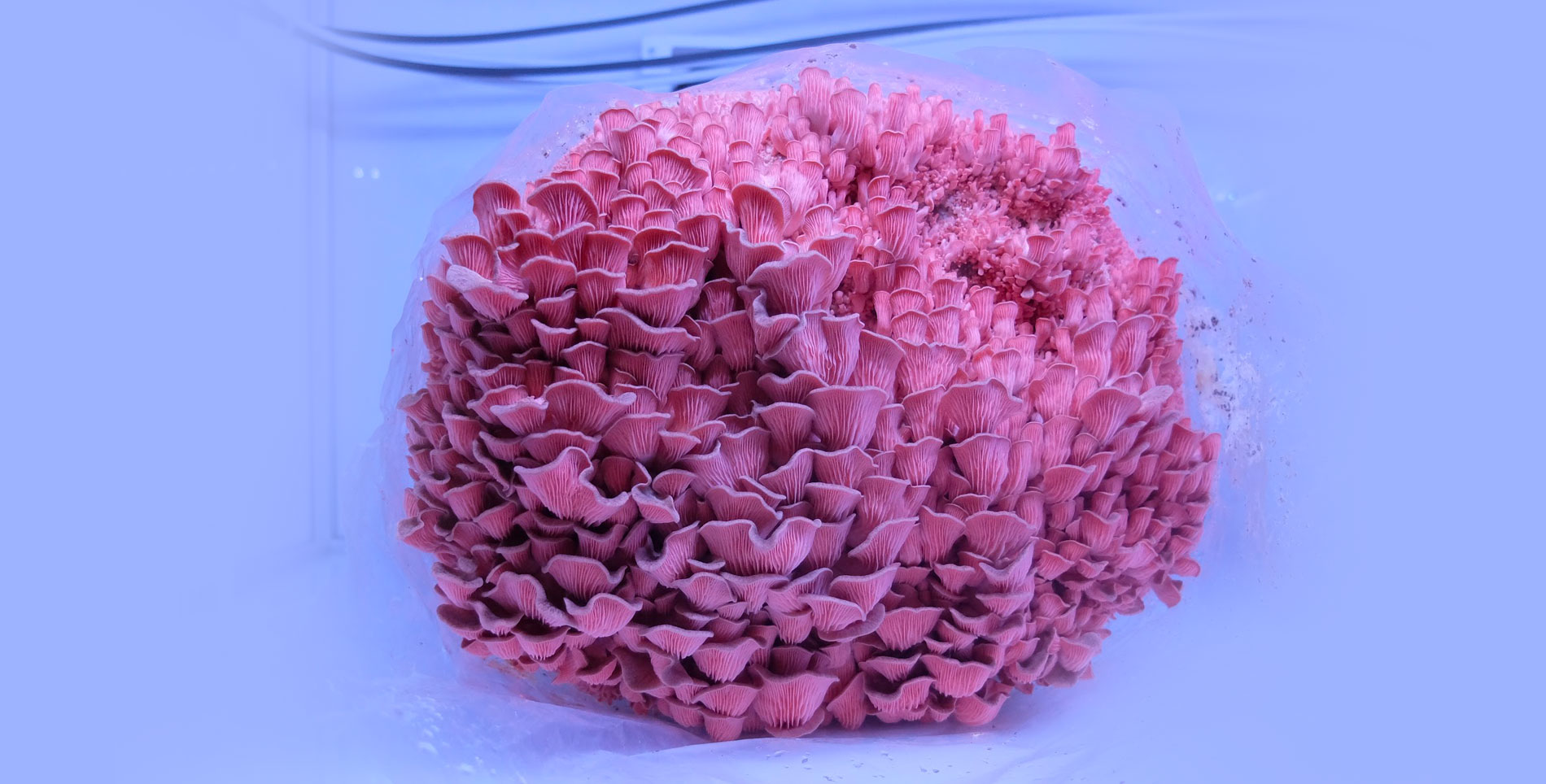

Our comments section is for members only.
Join today to gain exclusive access.